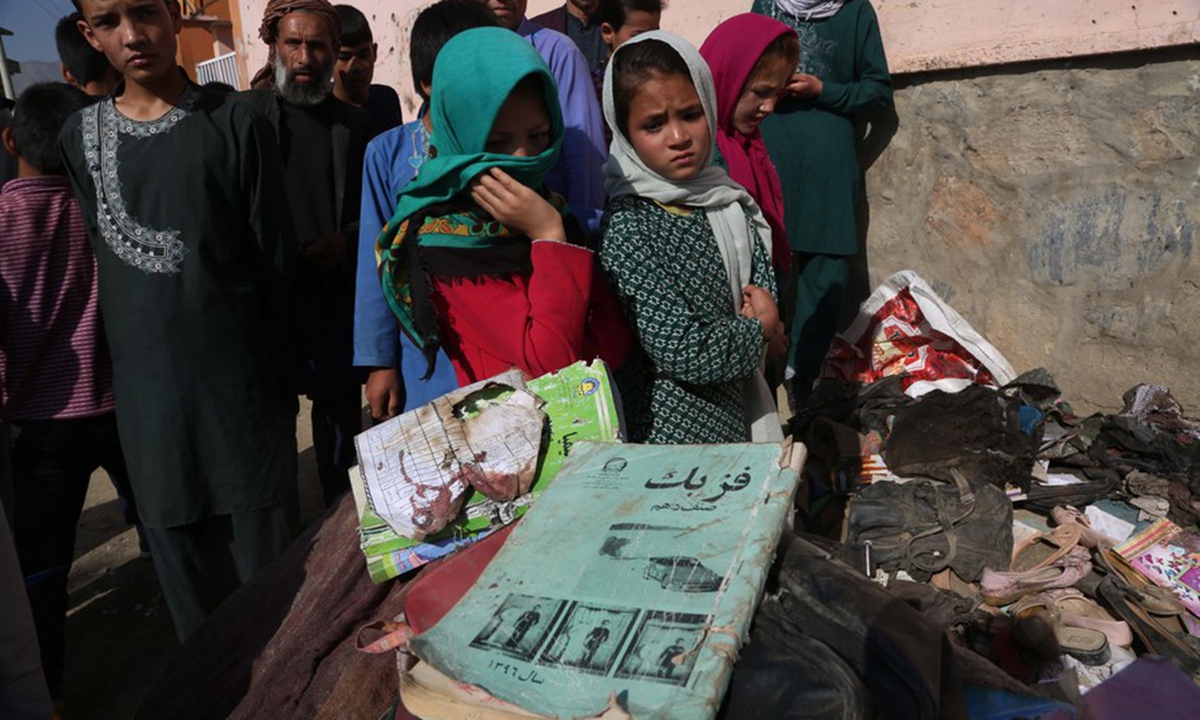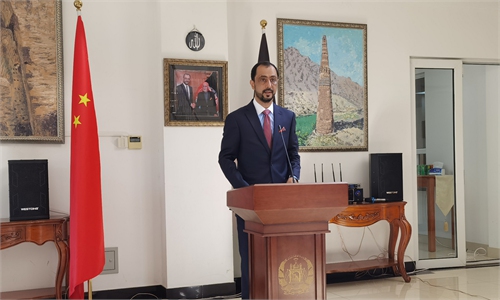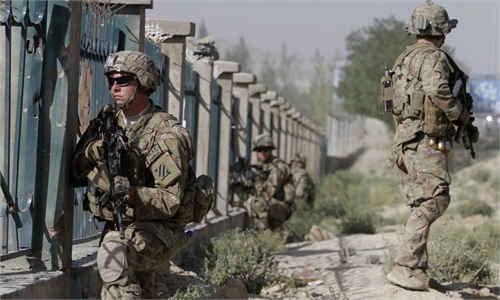'Afghan-led, Afghan-owned' is way forward in US aftermath

Photo taken on May 9, 2021 shows the books of students who were killed in a car bomb attack at the site of explosion in Kabul, capital of Afghanistan. Photo: Xinhua
Against the backdrop of the US and NATO unilaterally pushing ahead troop withdrawal from Afghanistan, risks of turmoil are growing. To responsibly respond to this, Chinese State Councilor and Foreign Minister Wang Yi presided over the 4th China-Afghanistan-Pakistan Trilateral Foreign Ministers' Dialogue on Thursday.Wang raised five propositions for advancing peace and reconciliation in Afghanistan. First, adhere to the fundamental "Afghan-led, Afghan-owned" principle. Second, maintain the momentum of intra-Afghan talks. Third, bring the Taliban back into the political mainstream. Fourth, the international community and countries in the region should provide full support. Fifth, strengthen sincere cooperation among China, Afghanistan and Pakistan.
The proposals mirrored that while the US-led West is being irresponsible over Afghan peace and reconciliation, China is promoting this peace process in a more proactive manner by formally putting forward the Chinese plan.
The peace and stability of Afghanistan is related to the security of western China and the implementation of the China-proposed Belt and Road Initiative (BRI). However, China has no intention of filling the vacuum left by the withdrawal of the US, nor will China involve in the internal conflict in Afghanistan like the US did. China does not tolerate Afghanistan being trapped in war again and turned into a hotbed of terrorist forces such as the East Turkestan terrorist organizations. This would pose a threat to China's Xinjiang Uygur Autonomous Region and the BRI.
Since 2017, China has started to make diplomatic preparations for the possible withdrawal of US troops from Afghanistan, and has set up a dialogue mechanism among foreign ministers of China, Afghanistan and Pakistan. The video conference on Thursday is the fourth meeting of the China-Afghanistan-Pakistan Trilateral Foreign Ministers' Dialogue. From the five propositions Wang had put forward, it can be seen that the plan proposed by China to resolve the issue of peace and reconciliation in Afghanistan has three characteristics.
To begin with, China fully respects Afghanistan's status as an independent sovereign country. It also respects the fundamental interests of the Afghan people, their history, and reality. This clearly embodies China's consistent principle of noninterference in other countries' internal affairs.
As Afghanistan's neighboring country that also severely suffers from terrorism, extremism and separatism, China has its interests in the Afghanistan issue. Beijing doesn't want Kabul to become the hotbed of those horrible acts and beliefs.
However, since China doesn't harbor geopolitical ambitions in this region, it will not promote its political system or governance model to champion its geopolitical interests as the US has always done. Nor will it meddle in Afghanistan's internal affairs as the US does by introducing a solution where Americans lead and control Kabul's domestic affairs. Instead, China will firmly adhere to the principle of letting Afghans be the leader and owner of their country.
As for issues concerning the Taliban, China will continue to respect reality and act according to the situation. The current Afghan government plays a leading role in the country's peaceful reconciliation process. But the Taliban also represents the interests of a large percentage of Pashtun ethnic people who should not be excluded from the country's authorities. Otherwise, the Afghanistan issue will not be resolved.
Second, the Chinese solution is a multilateral and inclusive solution based on the Five Principles of Peaceful Coexistence. It is a solution that reflects the political wisdom of the East.
China is a mediator in the peaceful reconciliation process of Afghanistan. Unlike the West, Beijing will not stand by one side against the other. China knows clearly that Islamic countries have their own political traditions and Afghanistan has its own national conditions. Therefore, it hopes to find an inclusive solution based on respect for Afghanistan's political and historical traditions.
On the other hand, the Chinese solution includes the interests of neighboring countries due to Afghanistan's ethnic composition and its ties with its neighbors. Kabul's neighbors are all the concerned parties in the Afghanistan issue. They should play a more important role through the United Nations (UN), as well as regional mechanisms such as the Shanghai Cooperation Organization.
China has also emphasized the important factors in the process of Afghanistan realizing peace and reconciliation: Respect the Taliban's political status and acknowledge the vital role of Pakistan in this process. This is why China proposed for a trilateral mechanism. This process is one based on consultative democracy, a model different from the Western-style democracy. The West also has an important role in this process: Western countries should assure that Afghanistan won't return to civil war due to their military withdrawal.
Last but not least, China has provided a political plan that lays a social-economic foundation for a political solution to the issues faced by ordinary Afghans. If Afghanistan fails to take social-economic developments into consideration, the country is likely to fall into turmoil again - as it has suffered from decades of wars. The US envisioned in 2011 the New Silk Road initiative to solve the problems of Afghanistan, but the plan included too many geopolitical considerations. Besides, Washington didn't come out with enough practical projects to promote this plan. In comparison, the mechanism of the China-Afghanistan-Pakistan Trilateral Foreign Ministers' Dialogue started from economic cooperation. It eyes Afghanistan's social-economic problems while paving the way for political cooperation between Kabul and Islamabad.
In its efforts to promote peace and national reconciliation in neighboring countries, China played an important role in helping Cambodia under the UN framework. Now, China has raised propositions that meet the interests of every party involved in the Afghanistan issue. However, whether or not the issue will be settled depends mainly on the effectiveness of consultations between the Afghan government and the Taliban.
The author is secretary-general of the Research Center for China-South Asia Cooperation at Shanghai Institutes for International Studies, visiting fellow of the Chongyang Institute for Financial Studies, Renmin University of China and distinguished fellow of the China (Kunming) South Asia & Southeast Asia Institute. opinion@globaltimes.com.cn


